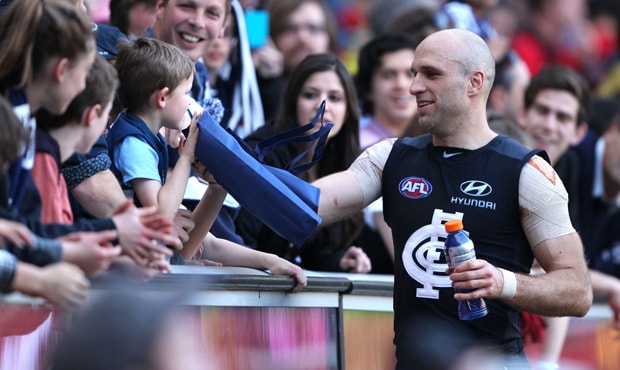He was suddenly lost in the shadows of the Ponsford Stand, the edifice so-named after the famed Australian batsman . . . and as with Bill Ponsford’s legendary contemporary, Chris Judd’s leave-taking seemed so oddly Bradmanesque.
Just as Don Bradman disappeared still wanting for the most famous four he never hit, Carlton’s footballer of a generation, the bald man in the Navy Blue who pranced around them as if they were pebbles, was gone before the quarter-time bell.
In truth, the bell had already tolled for Christopher Dylan Judd. The damned knee had given way and it just wasn’t meant to end like this. He had, after all, prevailed in a marking contest with Adelaide’s Patrick Dangerfield and the Sherrin was yet again his - only now he couldn’t complete the next play, or the next one, or the next.
And so, in his 145th and final appearance for the Carlton Football Club, Judd took his leave of the Melbourne Cricket Ground - down the same race from which he first led its men out some seven seasons before. That happened on the night of Thursday, March 20, 2008, when the newly-appointed captain completed his much-heralded Carlton debut.
Six months previous, Dick Pratt and the Princes Park powerbrokers had seized a once-in-a-lifetime opportunity to land the greatest footballer in Australia at the peak of his powers.

The journey for Judd began in that famous draft of 2001, when West Coast with selection three called his name after Luke Ball and Luke Hodge. The football public at large first bore witness to Judd’s greatness in the second round match of 2002 – Saturday, April 6 - against Collingwood on the MCG. Nathan Buckley and Heath Scotland went around for the black and whites that day, as did Ben Cousins, Daniel Kerr and the brothers Matera for the Eagles - and Judd racked up 19 touches in the one-point ball game won by the hosts.
Carlton knew what it was getting with Chris Judd, whose first hundred and a bit for West Coast earned him the club captaincy, best and fairests, a Players’ Association MVP and multiple All-Australian selection, together with the Brownlow, Norm Smith and Premiership Medallions.
In landing Judd’s prized signature, Carlton thwarted the best laid plans of three serious suitors (Collingwood, Essendon and Melbourne) and on the morning of Wednesday October 11, 2007 made the deal public – Judd and selection 46 for Josh Kennedy and selection three.
That afternoon, C. Judd scaled the steps of the since-demolished George Harris Stand to front the fourth estate, members of which had turned out in their droves for the landmark moment. On the way, he signed a guernsey handed him by The Age sports columnist and impassioned Carlton follower the late Geoff McLure. “You’re the first,” Judd scribbled, across the first of countless No.5s to which he would commit his moniker.
Bit of a sad day today, but a big thank you to this lot and everyone else for the memories along the way. pic.twitter.com/sU1R6iONxn
— Chris Judd (@cjayfive) June 9, 2015Within the confines of the John Nicholls Room, Judd told the assembled media that he’d committed to this football club firstly because he always believed his new employer could get the deal done, and secondly, “because I can be part of something from the ground up . . . that’s the exciting part of it for me”.
The No.5 for which Judd settled was most recently worn by Kennedy, a reluctant pawn in the much-heralded cross-country trade. The number also graced the backs of Andrew McKay, Ken Sheldon and Syd Jackson, and in olden times the 1915 Premiership player George Challis who was blown to bits in a trench in Armentieres some nine months after his moment in the September sun.
At Carlton, as at West Coast, Chris Judd gave all that he could possibly give - and the return was similarly spectacular – three club best and fairests, All-Australian recognition, another AFLPA MVP and another Brownlow.
Those who marveled at Chris Judd’s genius through 145 Carlton games will doubtless draw on their own precious recollections. For this reporter, an enduring memory relates to those final quarter heroics of four seasons ago, when the great man willed his team over the line in a famous victory on a sodden SCG.

There’s a certain futility in trying to draw comparisons with Judd in an on-field context, for he is a generational player the likes of which is rarely, if ever, seen - and yet in the context of the period in which he played, thoughts turn to a Carlton champion of a bygone era.
Horrie Clover represented Carlton in two more senior appearances than Judd, plying his craft at Princes Park as a centre half-forward through 11 seasons from 1921. A returned serviceman, Clover gave his all to the club through the longest Premiership drought in its largely illustrious history.
Clover came and went in those 23 barren years from 1915, but such was his virtuosity that he almost singlehandedly kept the turnstiles clicking. So it was with Judd, whose second coming at Carlton in late 2007 raised the collective spirits of the tens of thousands who’d lamented the flagging fortunes of a football club which had somehow lost its way .
While it’s sadly true that the much sought after second Premiership eluded him, it could truly be said of Chris Judd that his greatest gift to the people of Carlton was the gift of hope.
And so it’s thankyou and goodbye to Christopher Dylan Judd. The great man has, as “The Don” did at The Oval in ’48, raised his bat for the last time.



